
Study: ‘Ultranationalist’ groups gaining traction in Malaysian online space following Umno’s defeat in 2018 polls
On 17 January 2023, The Malay Mail reported on the findings of Asia Centre’s latest report, “Internet Freedoms in Malaysia: Regulating Online Discourse on Race, Religion and Royalty.” The Malay Mail highlighted Asia Centre’s identification of ultranationalist voices in the online space that are increasingly limiting progressive voices and the advocacy of minorities rights of all backgrounds – gender, ethnic or religious minorities.
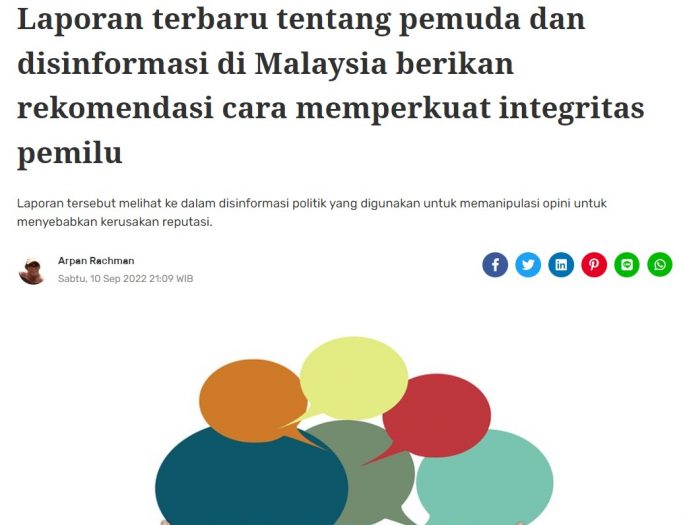
“Laporan terbaru tentang pemuda dan disinformasi di Malaysia berikan rekomendasi cara memperkuat integritas pemilu [Recent report on youth and disinformation in Malaysia provides recommendations on how to strengthen electoral integrity]”
Arpan Rachman from Alinea.id discussed recommendations for a strengthening electoral system in Malaysia. These were provided in Asia Centre’s baseline study Youth and Disinformation in Malaysia: Strengthening Electoral Integrity. The article chose two examples to review: for the Malaysian General Elections Commission to establish an election fact-checking mechanism; and for educational institutions to include digital and media literacy in their curriculum.
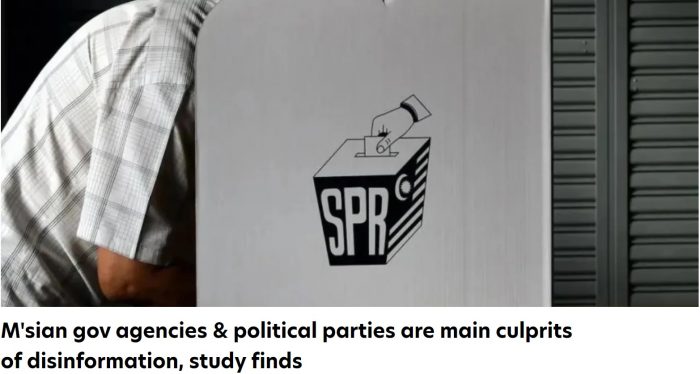
“M’sian gov agencies & political parties are main culprits of disinformation, study finds”
On 8 September 2022, Danial Martinus from Mashable shared the findings of Asia Centre’s baseline study Youth and Disinformation in Malaysia: Strengthening Electoral Integrity in an article ‘M’sian gov agencies & political parties are main culprits of disinformation, study finds’. Commenting on the case of Anwar Ibrahim who had been under attack from a sustained disinformation campaign, the article recommends educational institutions, the Election Commission, the government, NGOs, the media, technology companies, political parties, and the youth to share responsibilities in managing the information sphere.
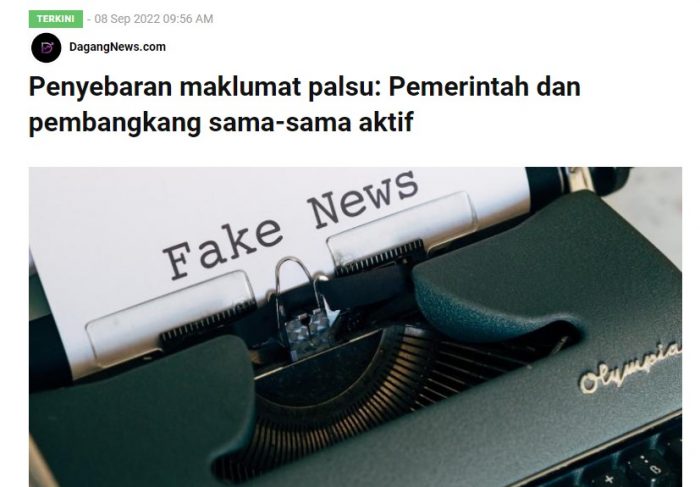
“Penyebaran maklumat palsu: Pemerintah dan pembangkang sama-sama aktif [Spread of disinformation: Both government and opposition have been active]”
The Indonesia-based Dagan News reported on Asia Centre’s baseline study Youth and Disinformation in Malaysia: Strengthening Electoral Integrity on 8 September 2022. Of a number of key findings, the article focused on two: that the topic of homosexuality and sexual promiscuity has been one recurring pattern of disinformation towards politicians; and that disinformation can come from the government as well as the opposition.

“Political competition to intensify disinformation in GE15”
The Vibes, on 7 September 2022, picked up Asia Centre’s baseline study Youth and Disinformation in Malaysia: Strengthening Electoral Integrity, to discuss its key findings. It noted the conclusion of the report that “falsehoods [are] expected to be widely deployed … in run-up to, during and after general elections”.

“Govt agencies, political parties the most active in spreading disinformation, new study finds”
Following the launch of Asia Centre’s baseline study Youth and Disinformation in Malaysia: Strengthening Electoral Integrity, an article was published in Malay Mail on 7 September 2022 on the study’s key findings and recommendations.
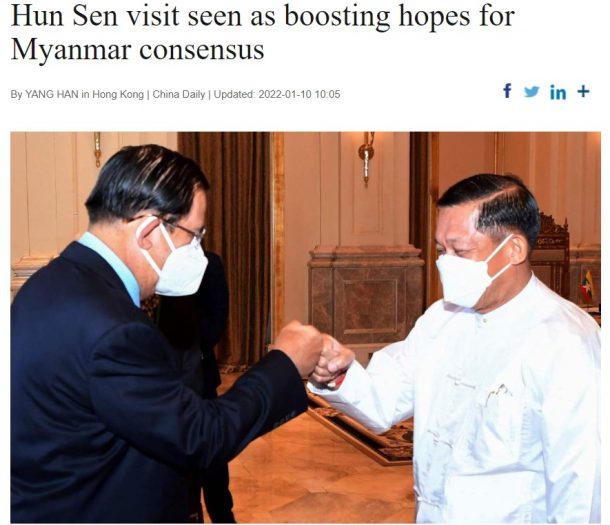
“Hun Sen visit seen as boosting hopes for Myanmar consensus”
Asia Centre’s Dr. James Gomez was asked for input on Cambodia PM’s visit to Myanmar in an article published on 10 January 2022 by China Daily. In the interview, Dr. Gomez said that following the visit, Hun Sen and Cambodia, as chair of ASEAN, would be in a politically strong position to invite Myanmar’s military leaders or representatives to meet in Cambodia. This article was also re-published in Khmer Times here.
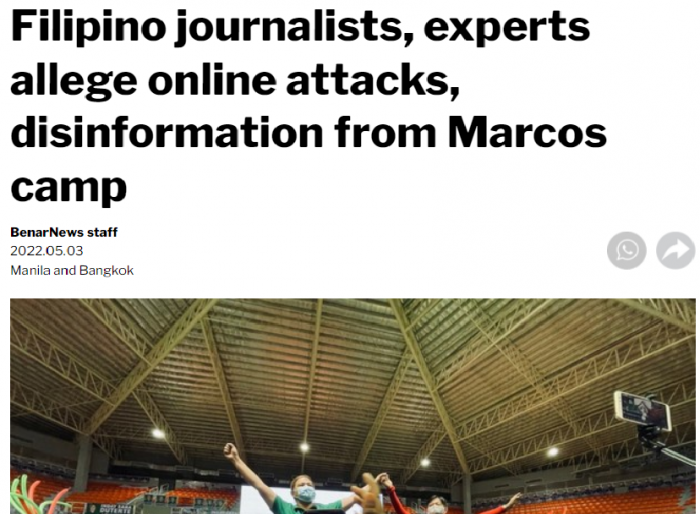
“Filipino journalists, experts allege online attacks, disinformation from Marcos camp”
Key messages from the speakers of Asia Centre’s 2022 World Press Freedom Day (3 May 2022) Roundtable Discussion “2022 Philippines Presidential Election: Fake Accounts, Bots and Trolls” were reported in an article by BenarNews. Speakers noted the increased prevalence of disinformation in the online space during the campaign trail.
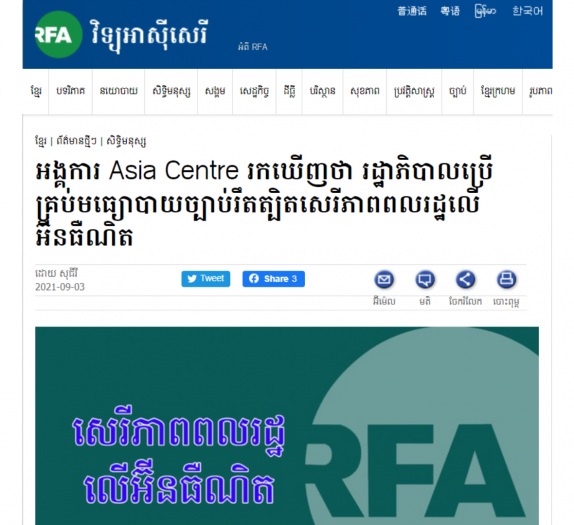
“Asian Think Tank found that the new NIG is a gateway to control”
On 3 September 2021, RFA Khmer reported on Asia Centre’s webinar “Internet Freedoms in Cambodia: A Gateway to Control”. The article echoes Asia Centre’s recommendations for a data protection framework.
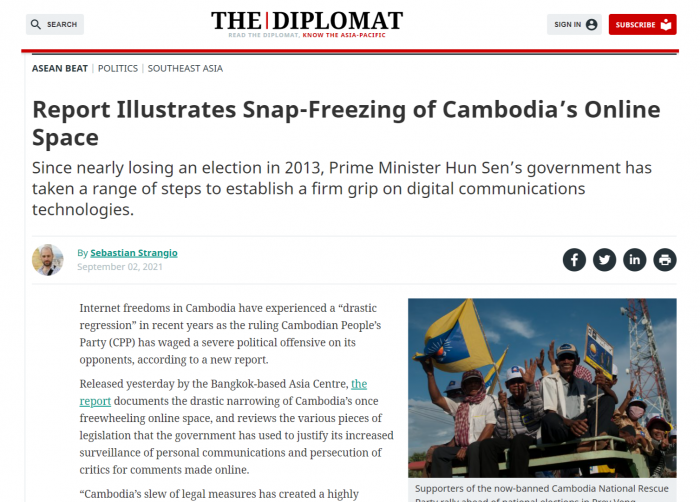
“Report Illustrates Snap-Freezing of Cambodia’s Online Space”
On 2 September 2021, The Diplomat published an article on the regression of internet freedoms in Cambodia, based on Asia Centre’s report “Internet Freedoms in Cambodia: A Gateway to Control”. The article reviews the recent effort of the ruling Cambodian People’s Party to silence its critics and repress any form of dissent. It also echoes Asia Centre’s call for a personal data protection framework made during the report launch.
To read the article click here
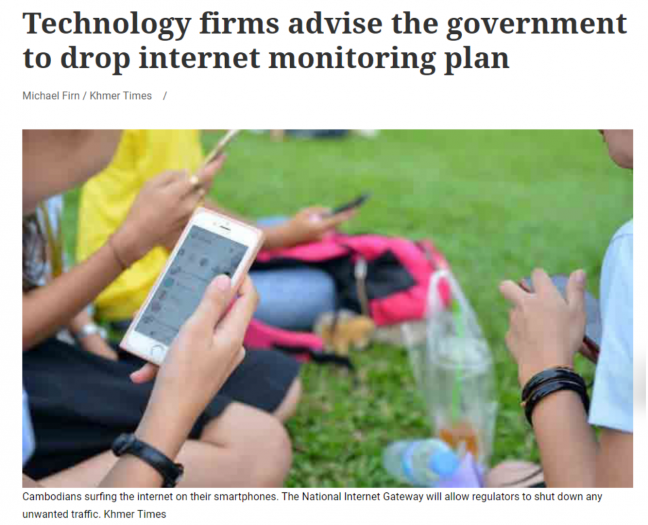
“Technology firms advise the government to drop internet monitoring plan”
On 2 September 2021, Khmer Times reported on Asia Centre’s launch event for the baseline study Internet Freedoms in Cambodia: A Gateway to Control. The news article reports on the calls made at the launch to the Cambodian government to revise its plans for a National Internet Gateway, as it will have dramatic effects on the internet users’ freedoms.
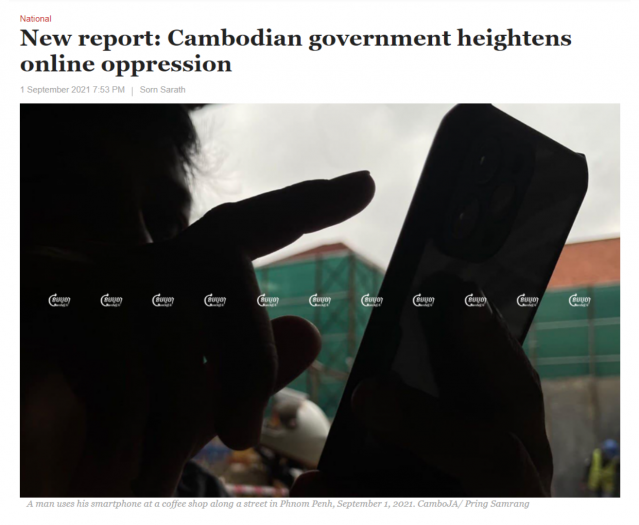
“New report: Cambodian government heightens online oppression”
On 1 September 2021, the Cambodian government Journalists Alliance Association (CamboJA) News Agency reported on Asia Centre’s launch event for its baseline study Internet Freedoms in Cambodia: A Gateway to Control. The news article highlighted the baseline study’s analysis that a range of legal provisions are being used by the government to suppress dissenting political opinions.
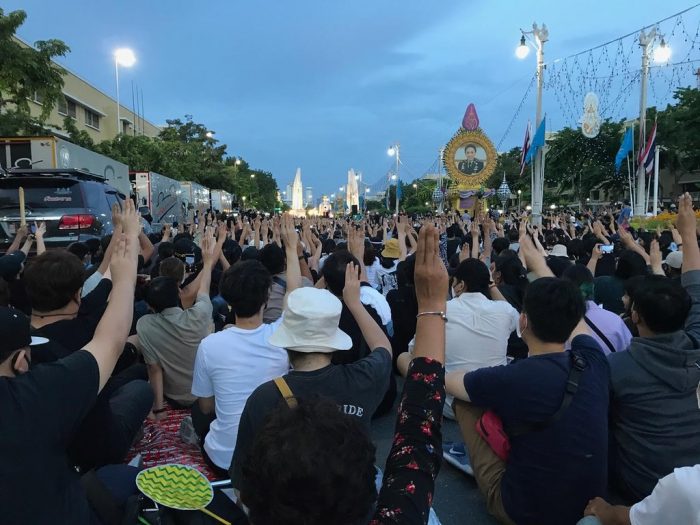
“Four NGOs submitted report to the UN Special Rapporteur regarding freedom of assembly and association in Thailand”
On 17 August 2021, Prachatai reported on Asia Centre’s joint submission titled “Protection of Human Rights in the Context of Peaceful Protests During Crisis Situations” to the UN Special Rapporteur on the freedom of assembly and association. This submission was a collaboration among four organisations which included Asia Centre, Destination Justice, Human Rights Lawyers Associate, and Thai Lawyers for Human Rights.

“Pakistani journalist bagged second prize in Asia Equitable Award”
On 31 March 2021, PTV World from Pakistan broadcast its report on the Pakistani journalist, Umar Bacha, whose article made it to the finals and won second prize at the 2020-21 Journalism for an Equitable Asia Award Ceremony.
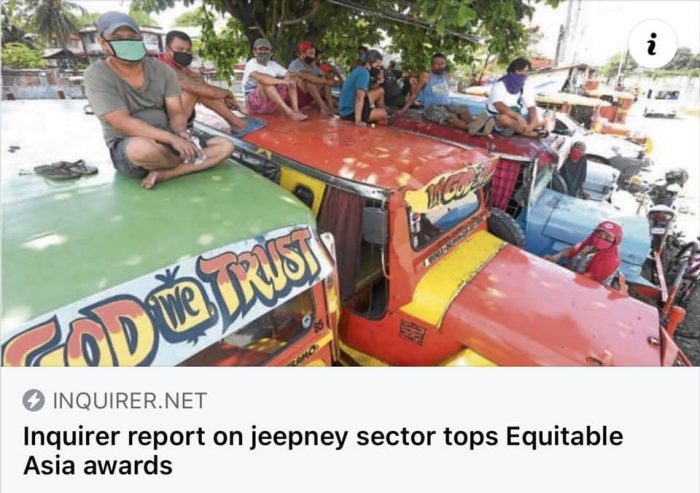
“Inquirer report on jeepney sector tops Equitable Asia awards”
On 27 March 2021, the Philippines Inquirer reported on the Filipino candidates whose articles made it to the finals and won the top prize at the 2020-21 Journalism for an Equitable Asia Award Ceremony. Mark Saludes, Krixia Subingsubing and Mariejo S. Ramos were mentioned in the report.
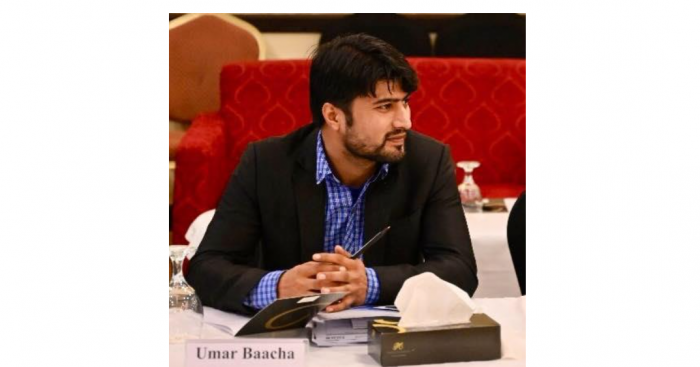
“Pakistani Journalist bagged second prize in Equitable Asia Journalism Awards”
On 26 March 2021, the Middle East North Africa Financial Network (MENAFN) reported on a Pakistani journalist, Umar Bacha, whose article won the second prize at the 2020-21 Journalism for an Equitable Asia Award Ceremony.
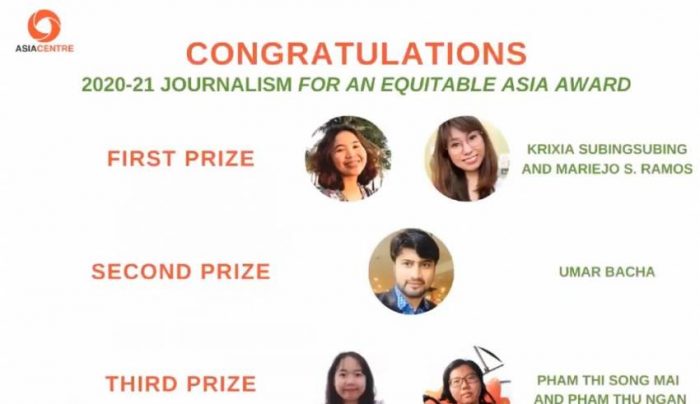
“Pakistani journalist clinches 2nd prize in Asia awards”
On 26 March 2021, The Northern Post, covered the submission from Pakistan, “Braving hostile terrains and attitudes, the women at the heart of KP’s Covid-19 battle” from Umar Bacha. This article won the second prize at “the 2020-21 Journalism for an Equitable Asia Award Ceremony”.

“Spreading unfavourable and false information“
On 11 October 2020, Dr. James Gomez revealed how some authoritarian governments in his region have undertaken measures to tackle the governance issue along with the question of accountability. It has been noted that some governments have been exploiting “fake news” as a political tool against their critics.

“Why the U.S. Elections Matter for Southeast Asia”
On 11 September 2020, Asia Centre’s Dr. James Gomez, in the online portal Cambodianess, explained, “The US has suffered brand damage,”… “So even if Biden comes in bringing with him a sense of multilateralism, respect for human rights and democratization, it will still take time.” Watch the corresponding webinar titled: “The 2020 US Presidential Election: Will it matter for democracy and human rights in Asia?” here.
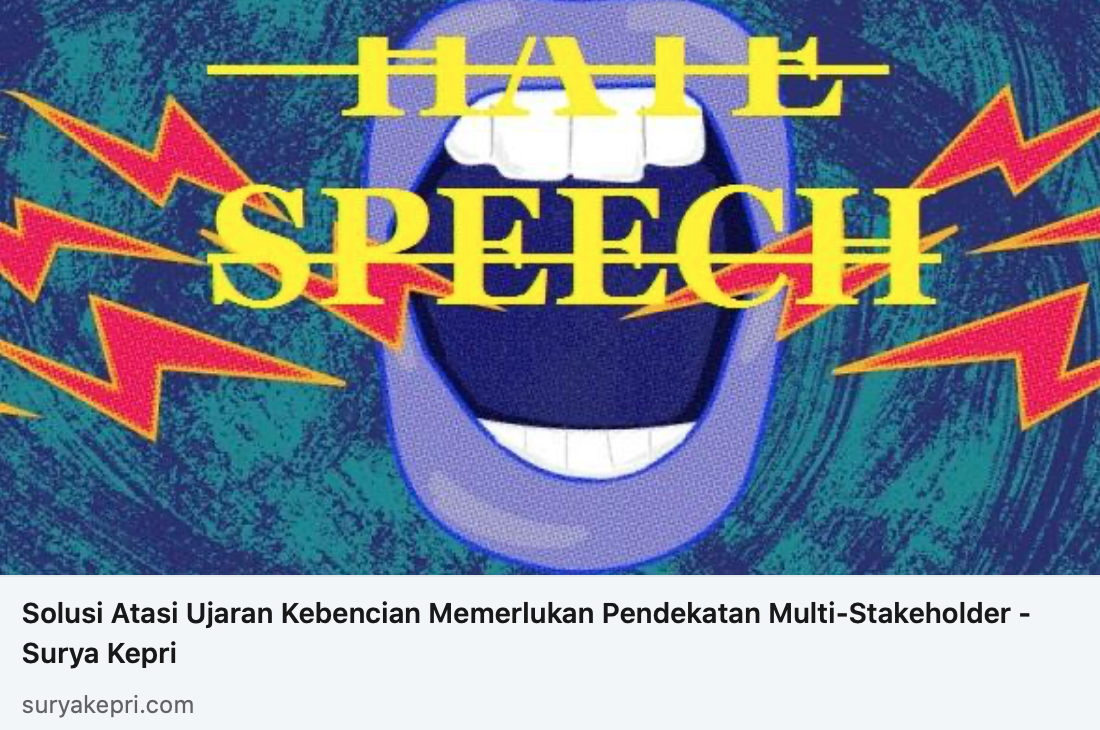
“Solusi Atasi Ujaran Kebencian Memerlukan Pendekatan Multi-Stakeholder” – Solution to Overcome Hate Speech Requires a Multi-Stakeholder Approach.
Asia Centre’s hate speech report launch was discussed in Bahasa, in Surya Kepri – an online news portal. Read it here.
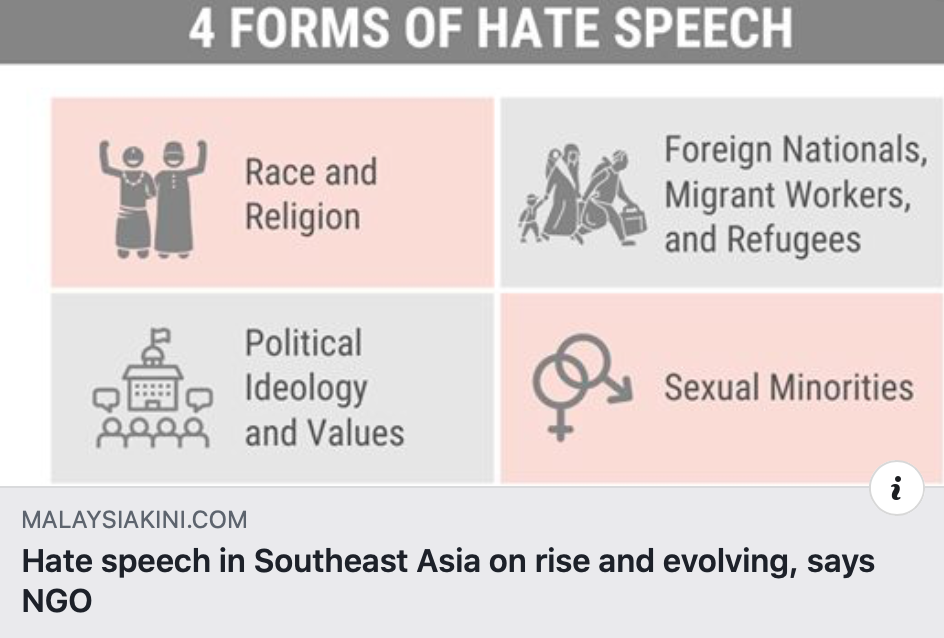
“Hate speech in Southeast Asia on rise and evolving, says NGO”
On 23 July 2020, Asia Centre’s baseline study Hate Speech in Southeast Asia: New Forms, Old Rules was covered in Malaysiakini, a Malaysian online news portal.
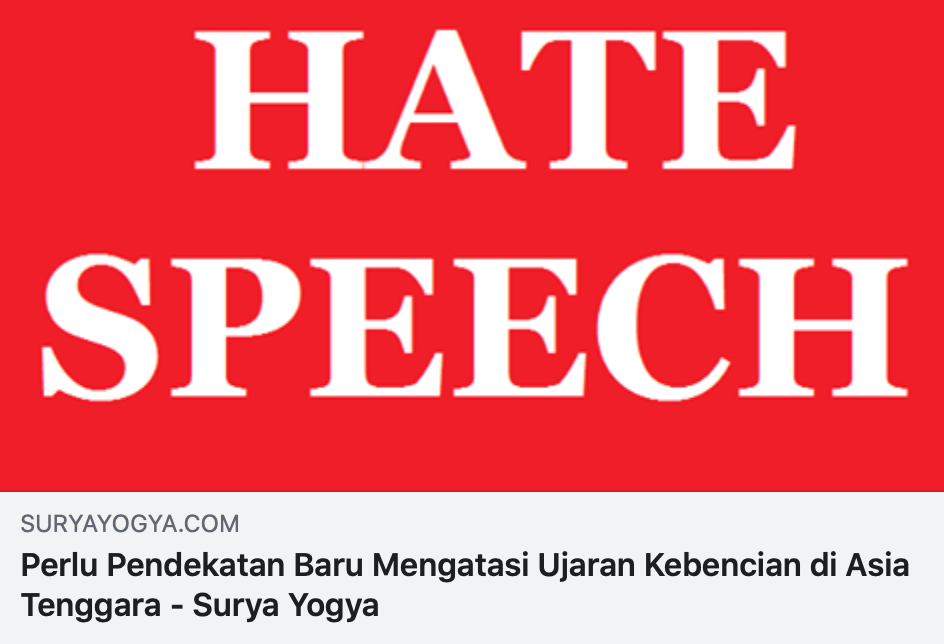
“Perlu Pendekatan Baru Mengatasi Ujaran Kebencian di Asia Tenggara” – A New Approach is Needed to Overcome the Speech of Hate in Southeast Asia.
On 22 July 2020, Asia Centre’s report launch event for the baseline study Hate Speech in Southeast Asia: New Forms, Old Rules was discussed and edited by Eddy Mesakh in Surya Yogya, an Indonesian news portal. Read the article here.

“아시아 내부 혐오 발언, 현명한 규제 ‘절실한 시점’ 왔다” – Hate speech in Asia: recommendations given at a pressing point in time.
On 22 July 2020, Asia Centre’s report Hate Speech in Southeast Asia: New Forms, Old Rules was analysed by Jung Ho-jae from ASEAN Express. The article is a summary of the report launch event held through Zoom.
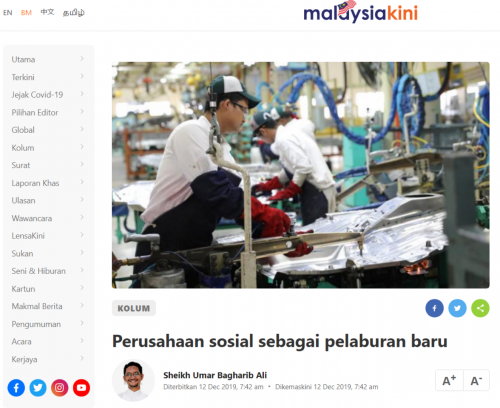
“Perusahaan sosial sebagai pelaburan baru“
On 12 December 2019, the newspaper Malaysiakini published a piece on Asia Centre as the Centre announced its future office in Johor Bahru. The newspaper welcomes Asia Centre’s research and activities to raise awareness and bring knowledge on social and human rights issues.

“星州日报:After National Front Lost Elections, ‘Many Media also lost financial support'”
Malaysia’s Sin Chew reported the 18 December 2019 Asia Centre and Oxfam joint Malaysia Launch: Journalism for an Equitable Asia Award. The report highlighted Malay Mail’s Editor-in-Chief, Datuk Wong Sai Wan’s observation that the National Front used to subsidize many of Malaysia’s media but these media companies suddenly lost financial support after the National Front lost the election.

“中國報: Datuk Wong Sai Wan asked, ‘How can media survive without financial support after the Regime Change?'”
Malaysia’s China Press reported on the 18 December 2019 joint Asia Centre and Oxfam Malaysia Launch: Journalism for an Equitable Asia Award. The report highlighted Malay Mail’s Editor-in-Chief, Datuk Wong Sai Wan suggestion that the award should consider the “sponsors” behind each media. As this feature presently distinguishes most of ASEAN’s media which are “sponsored” compared to current Malaysian media which is no longer “sponsored”.w
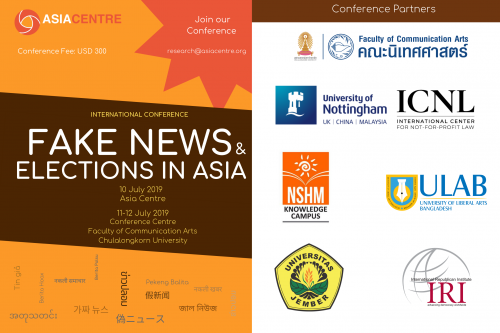
“The Balance Between Authenticity and Stifling Expression”
Asia Centre‘s International Conference on Fake News and Elections in Asia was featured in Ice Business Times on 20 June 2019. In the article, Asia Centre’s Conference Coordinator Tessa Alleblas explained the motivation behind legal developments surrounding fake news, noting that “Governments have argued that such legislation is in particular necessary in the run-up to elections as fake news or disinformation has the power to sway voters during the campaign period as well as fuel communal violence.”
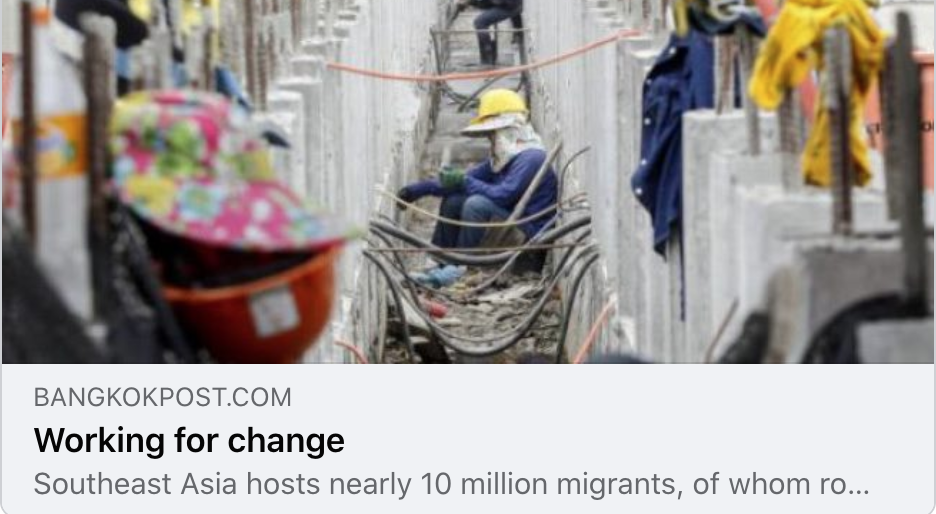
“Working for change”
On 4 September 2017, for the Bangkok Post, Asia Centre’s, Dr. Robin Ramcharan said the lack of consistent rules across the region for labour migrants is worrying. He believes, “a broader normative framework” is needed, especially for undocumented workers, to prevent abuses.
